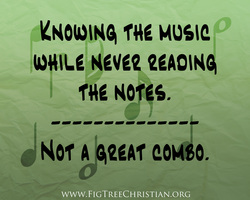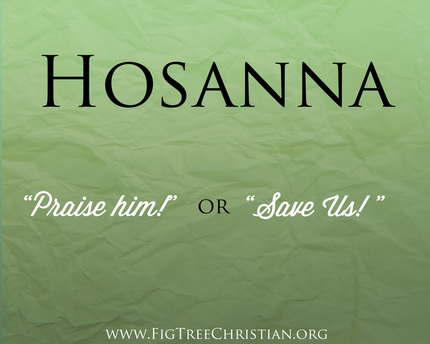|
Palm Sunday always takes place the Sunday before Easter, during the Lenten season. It is during this Sunday we are supposed recall how Jesus rode into Jerusalem just days before his crucifixion. According to scripture, when he rode in, people threw down coats and palms before him. They yelled "Hosanna."
In many Protestant churches, we recall this time by having the children bring in the palms, and placing them at the communion table. Palm Sunday marks the beginning of Holy Week. 8 Many people spread out their clothes on the road while others spread branches cut from the fields. 9 Those in front of him and those following were shouting, “Hosanna! Blessings on the one who comes in the name of the Lord! 10 Blessings on the coming kingdom of our ancestor David! Hosanna in the highest!” Mark 11:1-11 CEB Rev. Melissa Fain “Hosanna” is an interesting word. It is rooted in an old definition, but the meaning had changed by the time Jesus rode into Jerusalem on the Donkey(s). By Palm Sunday the word basically meant “Praise him!” This later understanding is how many of us play out Palm Sunday in our churches. We gleefully have our children march up to the front of the sanctuary and lay palms at the communion table. It is a celebration. It is a joyous day, which seems completely out of place with the Lenten season. That is, unless you understand the earlier definition of the word. Initially Hosanna meant, “Save us.” I couldn’t imagine how it must have felt to come into Jerusalem with coats waving, exuberant cheers, and glorious smiles. Then, to hear them cheerfully shout, “Save us!” I think it would make me cry. They were saying the right thing in completely the wrong way. Did they even realize what they were saying? If they knew, it was a cold and callous thing to say to Jesus. If they didn’t… how we can scream for help and not even know we are doing it. If Lent were a play, Ash Wednesday would be our opening act, and Palm Sunday becomes the cliff hanger to end Act I. It should leave us going to intermission with chills running down our spine. This crowd was either clueless or hostile. Either of those choices were really bad news for Jesus. Either hostility or cluelessness were clear signs of Jesus’ potential to living beyond the week. The New Testament shows what hostile crowds were capable of. Just look at the story of Stephen. It didn’t end well for him. Also, a clueless crowd could be pushed by more sinister forces: the religious leaders. - - - Elohim, You are creator of heaven and earth. You know each and every hair on our head. You understand us. We want to celebrate. We want to wave palms and shout, “Praise Him!” It is difficult, but help us call for help. Amen. Click here to work through the communal Lenten meditation. Melissa is an ordained minister in the Christian Church (Disciples of Christ). She has a BA in Music from Kennesaw State University and a Masters of Divinity from Candler School of Theology at Emory University. She is currently the senior minister at Fig Tree Christian. Melissa is the mother of two wonderful children, and wife to a great and supportive husband. In her spare time she loves arts and crafts which includes making costumes from scratch, and knotted bracelets.
Matthew 21:1-11 CEB When they approached Jerusalem and came to Bethphage on the Mount of Olives, Jesus gave two disciples a task. He said to them, “Go into the village over there. As soon as you enter, you will find a donkey tied up and a colt with it. Untie them and bring them to me. If anybody says anything to you, say that the Lord needs it.” He sent them off right away. Now this happened to fulfill what the prophet said, Say to Daughter Zion, “Look, your king is coming to you, humble and riding on a donkey, and on a colt the donkey’s offspring.”" The disciples went and did just as Jesus had ordered them. They brought the donkey and the colt and laid their clothes on them. Then he sat on them. Now a large crowd spread their clothes on the road. Others cut palm branches off the trees and spread them on the road. The crowds in front of him and behind him shouted, “Hosanna to the Son of David! Blessings on the one who comes in the name of the Lord!b]" Hosanna in the highest!” And when Jesus entered Jerusalem, the whole city was stirred up. “Who is this?” they asked. The crowds answered, “It’s the prophet Jesus from Nazareth in Galilee.” Eugene Boring, a former New Testament professor at Brite Divinity School, added a very interesting perspective to the Palm Sunday scripture. See, he didn’t think very highly of the crowds gathering to meet Jesus in the streets. After all, these people who were praising Jesus would be calling for crucifixion by the middle of the week. As Boring put it, the crowds knew “all the notes and none of the music. Knowing the truth isn’t the same as doing the truth.” They were singing praises and doing all the right things but they didn’t know why. Sometimes we get to Palm Sunday and forget that we are still in Lent. Even in times of joy and celebration we need to find a place to meditate and give back to God. I am really drawn to the musical analogy Boring gives because it forces me to reflect on myself. I spent most of my life in music. In many ways singing was my only form of public expression. I sang because my soul yearned to share some inner meaning that I just couldn’t put into words. In more than one way my life was lived opposite of Boring’s quote. I knew the music but I could not express the notes. This was made clear to me when I decided to seek a music degree from Kennesaw State University. Looking back, I had given a technically terrible audition to get into the school. My sight reading was sub-par, my listening skills test was terrible, and my technical performance was ok. Based on that there was no reason they should have accepted me. Not to mention I had rubbed one of the professors the wrong way. (I was always sure of myself and have always been driven to accomplish whatever I set myself to do. In my heart I knew I was going to get a degree in vocal music. However, my drive came across as arrogant. Because of that, the professor wanted to prove me wrong. Looking back, I can see it.) So what got me in? One of the other professors heard something: the music. Even though it was clear I would be struggling from beginning to end, he knew there was something in me worth teaching. After my audition he pulled me aside and talked to me for almost an hour. He was brutally honest. He told me where I failed. He told me the average student would never make it into the program with my scores. Then he told me he wanted me to pursue a music education. He said, and I paraphrase, "I felt the music. When it comes down to it, it doesn’t matter how musically intelligent you are or how well you read sheet music, most people can’t feel the music." He got me in the program and I made it out by the skin of my teeth. He would eventually write one of my letters of recommendation for seminary. By the time I finished my undergrad I not only knew the music but I could read the notes. I have expressed before that I believe life is more than one choice or the other. Often life means embracing how multiple options are correct at the same time. When it came to music I used to think it was all soul and no technique. In other words singing was more about knowing the music rather than knowing the notes. It was through a college education I discovered even the musicians who play by ear train themselves to perform at a certain level. You can desire to sing with passion and drive all day long but if you don’t have the chops to back it up, no one is going to listen. I also believe you can perform with technical perfection; you can read and perform music with pinpoint precision, but if you do not believe in your heart what you are doing ultimately you will not get to the top. That is just true for life. You can love any profession but if you don’t have the skills to back it up no one is going to hire you. In the same breathe, if you are good at what you do but there is no passion or drive behind your work you can’t hope to make it to the top because deep inside you don’t really want it. That is also true for faith. God gave us two mandates: to love God with all our heart and to love our neighbor as ourselves. One, loving God, requires our inner self. It is a personal relationship with the divine. The thing is, we can love God all day long but if we don’t back it up with action it doesn’t amount to much. In the same breathe we can go through the actions of being a faithful person; we can give to the poor and go to church every Sunday, but if we don’t have the love of God behind what we do- it’s empty and hollow. Jerusalem was shaken by Jesus’ unmistakable entry. They had no idea what was going on. People were celebrating and throwing branches in the street. Most of them were completely clueless yet, they followed the crowd. They shouted for deliverance; they called Jesus a prophet. Doing something correct, but not knowing why it is correct, is still wrong. When you perform a song it is one thing to be accurate, it is another to feel what you are performing. Following a tradition or habit without knowing why you are doing it is like singing without soul. Like I said before, it is empty and hollow. In many ways they didn't even know what they were saying.  Hosanna is a Hebrew word. The people in the streets who were yelling it took the word to mean 'praise' or 'glory.' In many ways that is how we define hosanna. That's not what it originally meant. Hosanna, literally translated means 'save me.' Now the crowds didn't say it that way and it is most certainly not translated in that manner. Even the Message uses the word hosanna. I just think it adds to the clulessness and spiritual emptiness of the crowds. Not only are these the same people who will be calling for Jesus' crucifixion later in the week, but they don't even realize they are calling out to Jesus for salvation! “Save us!” they yell as Jesus rides down the street. Meanwhile, as they say this they are smiling and praising the whole time. Jesus had to have known what was going on. He had to have felt the false admiration from the crowds and at the same time realized the scorn coming from the Jewish leaders not even participating in the celebration. Yet he continued. Yet he rode on starting a chain of events that could not be undone. I have to imagine, this being the most joyous day of the entire holy week... it was a letdown. It gives us a responsibility. We need to be authentic to our inner selves. We need to know why we are choosing to celebrate or revere on a Sunday morning. If Jesus were to ride a donkey down our main street would we be able to authentically praise God or would we know the notes and none of the music? Would we know whether to spill out praise and adulation or cries for salvation? These are important questions to think about. It doesn't matter what faith tradition you come from: over 2,000 years ago Jesus Christ willfully made a decision to become a human sacrifice. No matter what denomination you come from, that event happened. Today marks the beginning of something new. God comes to us in humility. Know in your heart how you are coming to God and play it out in the notes and the music. Know the truth and do the truth. Look for more Holy Week meditations throughout the week.
|
Categories
All
Archives
October 2023
|






 RSS Feed
RSS Feed